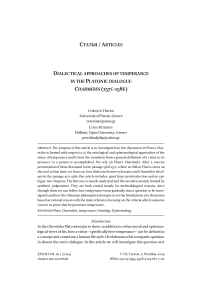Dialectical approaches of temperance in the platonic dialogue “Charmides” (157c-158e)
Автор: Terezis Ch., Petridou L.
Журнал: Schole. Философское антиковедение и классическая традиция @classics-nsu-schole
Рубрика: Статьи
Статья в выпуске: 1 т.18, 2024 года.
Бесплатный доступ
The purpose of this article is to investigate how the discussion in Plato’s “Charmides” is formed with respect to a) the ontological and epistemological approaches of the virtue of temperance and b) how the transition from a general definition of a virtue to its presence to a person is accomplished. After a concise presentation of those discussed in the passage 156d-157c, where we follow Plato’s views on the soul to that time, we focus on how dialectics between Socrates and “Charmides” develops in the passage 157c-158e. Our article includes, apart from an introduction and an epilogue, two chapters. The first one is mostly analytical and the second is mainly formed by synthetic judgements. They are both crucial mostly for methodological reasons, since through them we can follow how temperance turns gradually into a question to be investigated and how the Athenian philosopher attempts to set the foundations of a discussion based on rational reason with the main reference focusing on the criteria which someone can use to prove that he possesses temperance.
Plato, charmides, temperance, ontology, epistemology
Короткий адрес: https://sciup.org/147244193
IDR: 147244193 | DOI: 10.25205/1995-4328-2024-18-1-7-22
Список литературы Dialectical approaches of temperance in the platonic dialogue “Charmides” (157c-158e)
- Gadamer, H.-G. (1994) L'idée du Bien comme enjeu platonico-aristotélicien, transl. by P. David and D. Saatdjian. Paris.
- Lampert, L. (2010) How Philosophy became Socratic: A study of Plato's Protagoras, Charmides, and Republic. Chicago / London.
- Marcuse, Η. (1955) Reason and revolution. Hegel and the rise of social theory. London.
- Schmid, W. Th. (1998) Plato's Charmides and the Socratic ideal of rationality. New York.
- Tuozzo, Th. M. (2011) Plato's Charmides. Positive elenchus in a "Socratic" dialogue. Cambridge / New York.


